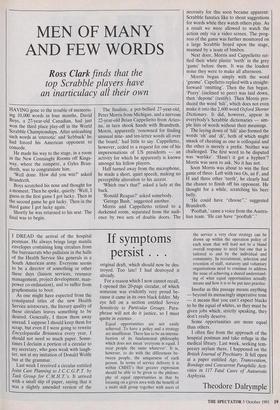If symptoms persist .
I DREAD the arrival of the hospital postman. He always brings large manila envelopes containing long circulars from the bureaucrats who pullulate in the halls of the Health Service like generals in a South American army. Everyone seems to be a director of something or other these days (liaison services, resource management, project development, man- power co-ordination), and to suffer from graphomania to boot.
As one might have expected from the constipated titles of the new Health Service aristocracy, the literary quality of these circulars leaves something to be desired. Generally, I throw them away unread. I suppose I should keep them for scrap, but even if I were going to rewrite Encyclopaedia Britannica every year, I should not need so much paper. Some- times I declaim a portion of a circular to my secretary, who goes weak with laugh- ter, not at my imitation of Donald Wolfit but at the grammar.
Last week I received a circular entitled Joint Care Planning to J.C.C.G.P.T. by Task Group for C. IVI.H.T.'s. It arrived with a small slip of paper, saying that it was a slightly amended version of the original draft, which should now be des- troyed. Too late! I had destroyed it already.
For a reason which I now cannot recall, I opened this 20-page circular, of which someone was evidently very proud be- cause it came in its own black folder. My eye fell on a section entitled Service Sensitivity to Particular Groups. Para- phrase will not do it justice, so I must quote in extenso.
Equal opportunities are not easily achieved. To have a policy and a strategy are insufficient. There has to be an interna- lisation of its fundamental philosophy which does not mean 'everyone is equal. I treat people the same whatever'. It is, however, to do with the differences be- tween people, the uniqueness of each person. In terms of service delivery it is within CMHT's that greater expression should be able to be given to the philoso- phy of equal opportunities in that by focusing on a given area with the benefit of a multi skill group together with users of the service a very clear strategy can be drawn up within the operation policy of each team that will lead not to a bland overall response to need but one that is tailored to and by the individual and community. In recruitment, selection and retention of staff, statutory and voluntary organisations need to continue to address the issue of achieving a shared understand- ing of what equal opportunities actually means and how it is to be put into practice. Insofar as this passage means anything
— beyond its menacingly imperative tone
— it means that you can't expect blacks to be the equal of whites, so they must be given jobs which, strictly speaking, they don't really deserve.
Some opportunities are more equal than others.
I often flee from the approach of the hospital postman and take refuge in the medical library. Last week, seeking tem- porary asylum there, I happened on the British Journal of Psychiatry. It fell open at a paper entitled Age, Transvestism, Bondage and Concurrent Paraphilic Acti- vities in 117 Fatal Cases of Auoerotic Asphyxia.
Theodore Dalrymple


















































 Previous page
Previous page